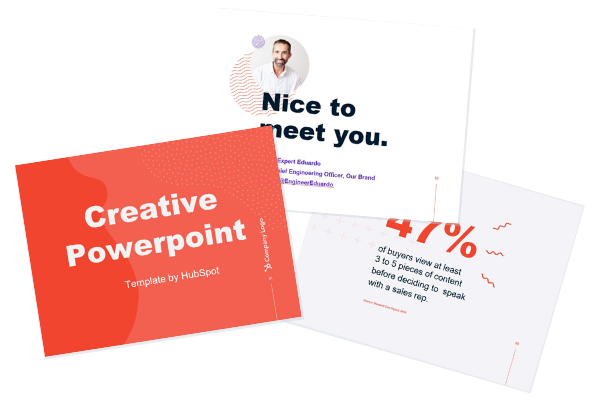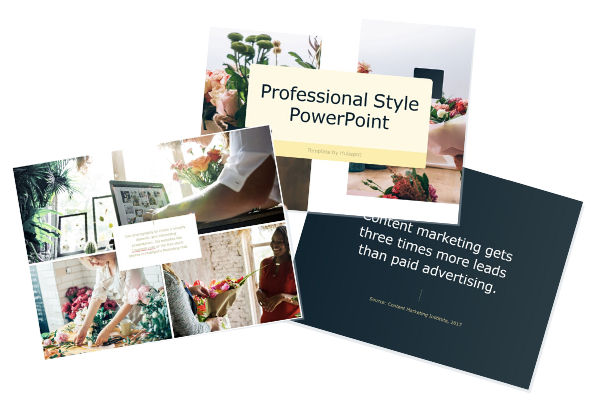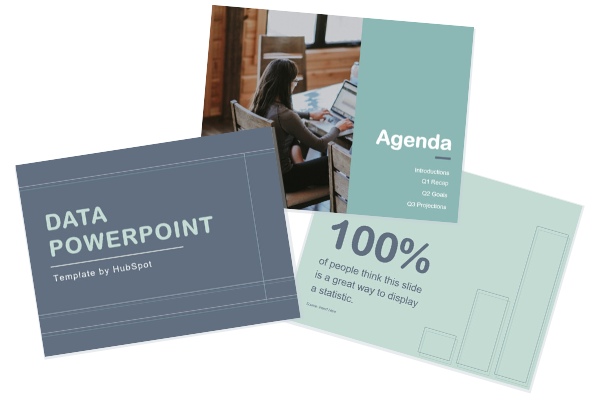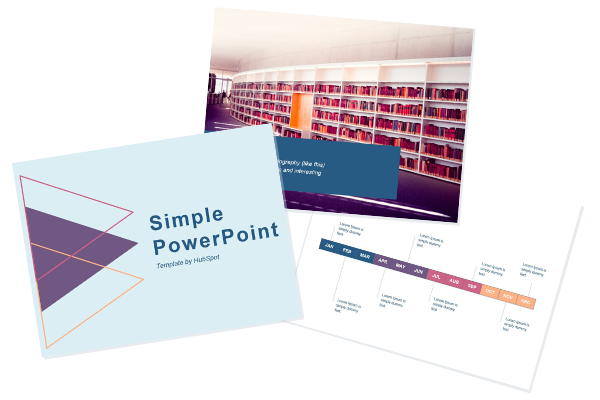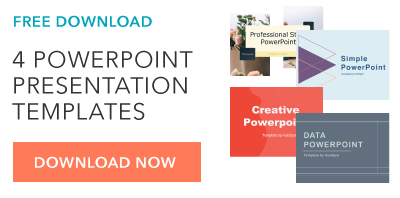When it comes to PowerPoint presentation design, there’s no shortage of avenues you can take.
While all that choice — colors, formats, visuals, fonts — can feel liberating, it’s important that you’re careful in your selection as not all design combinations add up to success. We’re not saying there’s one right way to design your next PowerPoint presentation, but we are saying there are some designs that make more sense than others.
In this blog post, you’ll learn how to create an awesome PowerPoint deck and then see real presentations that nail it in exactly their own way.
What makes a good PowerPoint presentation?
A great PowerPoint presentation gets the point across succinctly while using a design builds upon the point, not detract from it. The following aspects make for a great PowerPoint presentation:
1. Minimal Animations and Transitions
Believe it or not, animations and transitions can take away from your PowerPoint presentation. Why? Well, they distract from the design you worked so hard on — and from your content, too.
A good PowerPoint presentation keeps the focus on your argument by keeping animations and transitions to a minimum. That said, you don’t have to eliminate them all. You can use them tastefully and sparingly to emphasize a point or bring attention to a certain part of an image.
2. Cohesive Color Palette
It’s worth reviewing color theory when creating your next PowerPoint presentation. A cohesive color palette uses complementary and analogous colors to draw the audience’s attention, emphasize certain aspects, and deemphasize bits of information that the audience might not need at a certain point in time.
3. Contextualized Visuals
An image does speak more than words. And it’s been proven that the human brain is wired to process visuals much faster than words. Take advantage of that by including graphs, photos, and illustrations that can help you build upon your point while keeping your audience’s interest.
Make sure you contextualize those visuals by explaining verbally why that image is there. Otherwise, it’ll be distracting to the audience and may potentially cause more questions than answers.
PowerPoint Design Ideas
It’s impossible for us to tell you which design ideas you should go after in your next PowerPoint, because, well, we don’t know what the goal of your presentation is. Luckily, new versions of PowerPoint actually suggest ideas for you based on the content you’re presenting.
In PowerPoint 2016 and later, PowerPoint is filled with interesting boilerplate designs you can start with. To find these suggestions, open PowerPoint and click the “Design” tab in your top navigation bar. Then, on the far right side, you’ll see the following options:
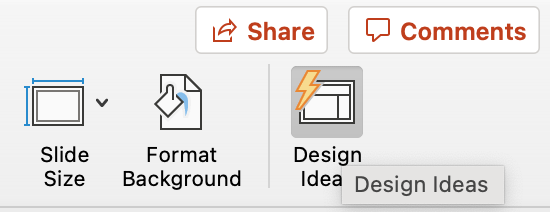
Click the “Design Ideas” option under this Design tab, as shown in the screenshot above. This icon will reveal a vertical list of interesting slide layouts based on what your slides already have on them.
Don’t have any content on your slides yet? You can easily shuffle this vertical list of design ideas by clicking various slides themes inside the color carousel to the far left of the Design Ideas icon, as shown below:
 As you browse and select from the themes shown above, the Design Ideas pane to the right will interpret them and come up with layouts. Below, we’ve included some of our favorite ones.
As you browse and select from the themes shown above, the Design Ideas pane to the right will interpret them and come up with layouts. Below, we’ve included some of our favorite ones.
In case you’re curious, we’ve used Avenir as the font in the following PowerPoint design ideas.
Atlas (Theme)
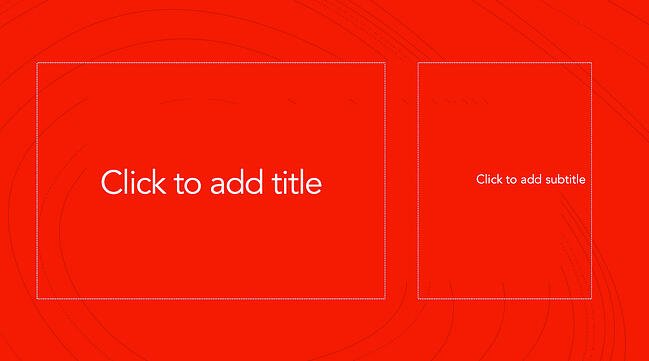 Covering a more creative subject for a younger or more energetic audience? On behalf of PowerPoint, might we suggest the cover slide design above? Its vibrant red background and fun lines will appeal to your audience.
Covering a more creative subject for a younger or more energetic audience? On behalf of PowerPoint, might we suggest the cover slide design above? Its vibrant red background and fun lines will appeal to your audience.
Madison (Theme)
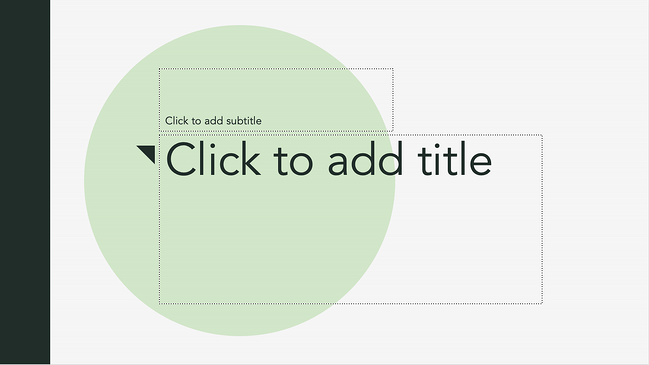 This design doesn’t have the intensity of the first slide on this list, but it maintains a sense of informality that all PowerPoint presentations benefit from.
This design doesn’t have the intensity of the first slide on this list, but it maintains a sense of informality that all PowerPoint presentations benefit from.
Parcel (Theme)
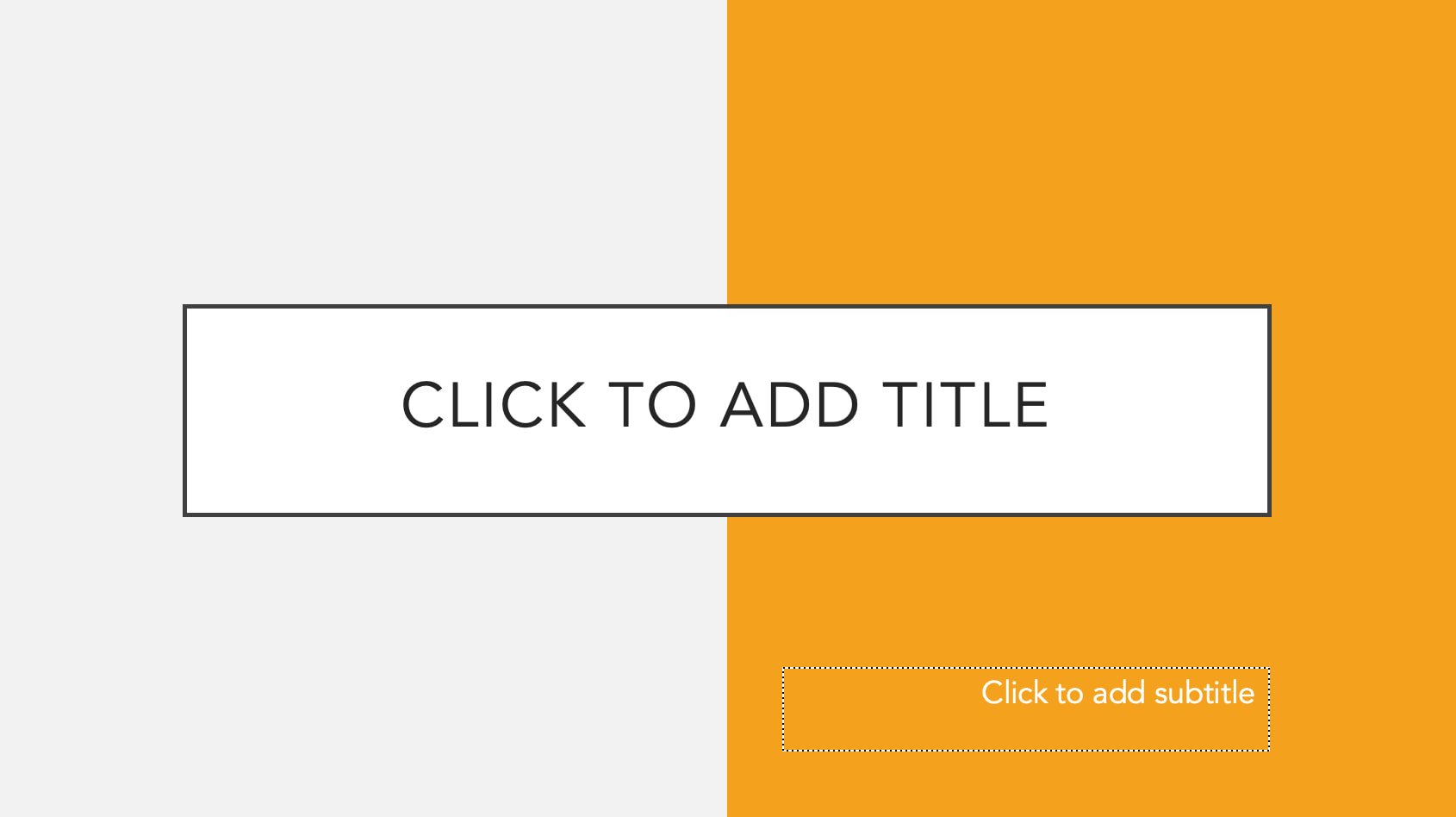 The color-blocked look in the design above sets a fun but relaxing tone for the audience.
The color-blocked look in the design above sets a fun but relaxing tone for the audience.
Crop (Theme)
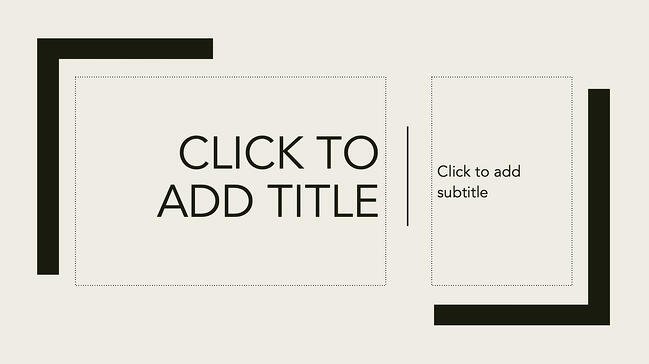 This PowerPoint design idea uses graphic elements such as lines and bars to give structure, contrast, and modern flair to your slides.
This PowerPoint design idea uses graphic elements such as lines and bars to give structure, contrast, and modern flair to your slides.
Badge (Theme)
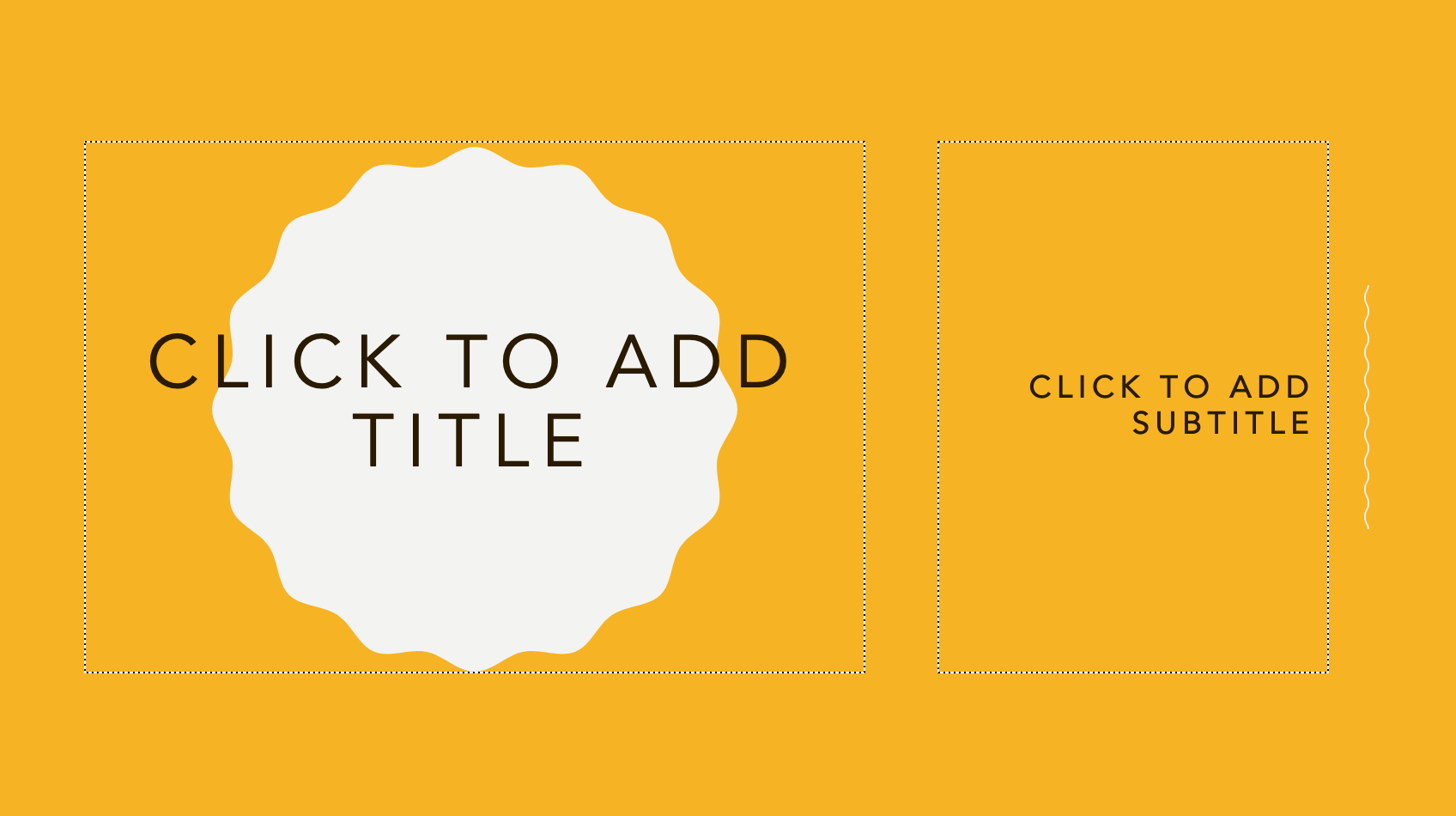 We’re particularly fond of this PowerPoint design style. By using lines and contrasting elements — like a burst, as shown above — you add depth to your slides. This can help your content capture and hold your audience’s attention more easily.
We’re particularly fond of this PowerPoint design style. By using lines and contrasting elements — like a burst, as shown above — you add depth to your slides. This can help your content capture and hold your audience’s attention more easily.
If you’re not fond of the built-in PowerPoint design themes, you can always download a PowerPoint template and input your content onto pre-made slide styles.
Let’s take a look at the best ones you can download below.
Creative PowerPoint (Template)
This template uses bright colors and plenty of white space to convey a modern but fun design. Organic shapes and geometric lines and patterns provide an extra visual element to the slides, achieving depth and personality. Get it here.
Download These Templates for Free
Professional Style PowerPoint (Template)
This PowerPoint style uses more neutral colors and fonts to create a calm and elegant vibe. It also pushes the presentation creator to use quality images to convey their points. Get it here.
Download These Templates for Free
Data PowerPoint (Template)
This template uses a rounded font to draw sharp contrast with the lines and graphs that will populate the presentation. It’s a great choice for providing engaging visuals despite the number-crunching content. Get it here.
Download These Templates for Free
Simple PowerPoint (Template)
By pairing vibrant colors with pale ones, this PowerPoint gives an understated feel, which can draw attention to the content while still being visually engaging. Get it here.
Download These Templates for Free
Instead of a presentation, you can also create an infographic in PowerPoint to effectively capture your audience’s attention.
Good Examples of PowerPoint Presentation Design
To see some examples of the best PowerPoint presentation designs, check out the following decks.
1. “The Search for Meaning in B2B Marketing,” Velocity Partners
We’ve said it once, and we’ll say it again: We love this presentation from Velocity Partner’s Co-Founder Doug Kessler. Not only is the content remarkable, but the design is also quite clever. While each slide employs the same background visual, the copy in the notebook unfolds brilliantly through a series of colorful doodles and bold text. This gives the presentation a personal feel, which aligns with the self-reflective nature of the concept.
2. “You Don’t Suck at PowerPoint,” Jesse Desjardins
If the contrast used throughout this PowerPoint presentation design were a human, we’d marry it. This skillful presentation from Jesse Desjardins employs the perfect color palette: balancing black and white photos with pops of fluorescent pink, yellow, and blue. The cheeky vintage photos work to reinforce the copy on each slide, making the presentation both interesting and visually appealing.
3. “Accelerating Innovation in Energy,” Accenture
Balancing visual backgrounds with text isn’t easy. More often than not, the text is formatted in a way that winds up getting lost in the image. This presentation from Accenture combated this issue by combining shapes and graphics to create contrast between the text and the background. Well done.
4. “Visual Design with Data,” Seth Familian
When you’re tasked with presenting a lot of information in a little bit of time, things can get sort of messy. To simplify this type of presentation, it’s a good idea to use a visual agenda like the one shown above. This index clearly signifies the start and finish of each section to make it easier for the viewer to follow along and keep track of the information. The presenter takes it further by including an additional agenda for each exercise, so that the audience knows what they’re supposed to do.
5. “How to Craft Your Company’s Storytelling Voice,” MarketingProfs
Do you love these hand drawn illustrations … or do you love these hand drawn illustrations? I mean, c’mon, this is amazing. Certainly it would have been easier to generate these designs online, but this approach highlights MarketingProf’s commitment to investing the time and thought it takes to create an out-of-the-box piece of content. And as a result, this presentation stands out in the best way possible.
6. “Blitzscaling: Book Trailer,” Reid Hoffman
If you’re going to go the minimalistic route, take note of this PowerPoint presentation example from Reid Hoffman. This clean design adheres to a simple, consistent color palette with clean graphics peppered throughout to make the slides more visually interesting. Overall there are no frills or unnecessary additions, which allows the informative content to take priority.
7. “Healthcare Napkins,” Dan Roam
This presentation dates back to 2009, but the design is still as good as ever. The colorful, quirky doodles help tell the story while also serving as an interesting way to illustrate data (see slides 20 and 21). For visual learners, this approach is much more inviting than a series of slides riddled with text-heavy bullet points.
8. “One Can Be Diverse: An Essay on Diversity,” With Company
This presentation employs both powerful images and modern typography to illustrate the point. While many of the slides contain long quotes, they are broken up in a way that makes them easily digestible. Not to mention all of the text is crisp, clean, and concise.
9. “10 Things your Audience Hates About your Presentation,” Stinson
his simplistic presentation example employs several different colors and font weights, but instead of coming off as disconnected, the varied colors work with one another to create contrast and call out specific concepts. Also, the big, bold numbers help set the reader’s expectations, as they clearly signify how far along the viewer is in the list of tips.
10. “Pixar’s 22 Rules to Phenomenal Storytelling,” Gavin McMahon
This presentation by Gavin McMahon features color in all the right places. While each of the background images boasts a bright, spotlight-like design, all of the characters are intentionally blacked out. This helps keep the focus on the tips, while still incorporating a visual element. Not to mention, it’s still easy for the viewer to identify each character without the details. (I found you on slide eight, Nemo.)
11. “Facebook Engagement and Activity Report,” We Are Social
Here’s another great example of data visualization in the wild. Rather than displaying numbers and statistics straight up, this presentation calls upon interesting, colorful graphs, and charts to present the information in a way that just makes sense.
12. “The GaryVee Content Model,” Gary Vaynerchuk
This wouldn’t be a true Gary Vaynerchuk presentation if it wasn’t a little loud, am I right? Aside from the fact that we love the eye-catching, bright yellow background, Vaynerchuk does a great job of incorporating screenshots on each slide to create a visual tutorial that coincides with the tips. He also does a great job including a visual table of contents that shows your progress as you go through the presentation (and aligns with the steps of content marketing, too).
13. “20 Tweetable Quotes to Inspire Marketing & Design Creative Genius,” IMPACT Branding & Design
We’ve all seen our fair share of quote-chronicling presentations … but that isn’t to say they were all done well. Often times the background images are poor quality, the text is too small, or there isn’t enough contrast. Well, this PowerPoint presentation from IMPACT Branding & Design suffers from none of said challenges. The colorful filters over each background image create just enough contrast for the quotes to stand out.
14. “The Great State of Design,” Stacy Kvernmo
This presentation offers up a lot of information in a way that doesn’t feel overwhelming. The contrasting colors create visual interest and “pop,” and the comic images (slides 6 through 12) are used to make the information seem less buttoned-up. Once the presentation gets to the CSS section, it takes users slowly through the information so that they’re not overwhelmed.
15. “Clickbait: A Guide To Writing Un-Ignorable Headlines,” Ethos3
Not going to lie, it was the title that convinced me to click through to this presentation … but the awesome design kept me there once I arrived. This simple design adheres to a consistent color pattern and leverages bullet points and varied fonts to break up the text nicely.
16. “Digital Transformation in 50 Soundbites,” Julie Dodd
This design highlights a great alternative to the “text-over-image” display we’ve grown used to seeing. By leveraging a split screen approach to each slide, Julie Dodd was able to serve up a clean, legible quote without sacrificing the power of a strong visual.
17. “Fix Your Really Bad PowerPoint,” Slide Comet
When you’re creating a PowerPoint about how everyone’s PowerPoints stink, yours had better be terrific. The one above, based on the ebook by Seth Godin, keeps it simple without boring its audience. Its clever combinations of fonts, together with consistent color across each slide, ensure you’re neither overwhelmed nor unengaged.
18. “How Google Works,” Eric Schmidt
Simple, clever doodles tell the story of Google in a fun and creative way. This presentation reads almost like a storybook, making it easy to move from one slide to the next. This uncluttered approach provides viewers with an easy-to-understand explanation of a complicated topic.
19. “What Really Differentiates the Best Content Marketers From The Rest,” Ross Simmonds
Let’s be honest: These graphics are hard not to love. Rather than employing the same old stock photos we’ve seen time and time again, this unique design serves as a refreshing way to present information that’s both valuable and fun. We especially appreciate the author’s cartoonified self-portrait that closes out the presentation. Well played, Ross Simmonds.
20. “Be A Great Product Leader,” Adam Nash
This presentation by Adam Nash immediately draws attention by putting the company’s logo first — a great move if your company is well known. He uses popular images, such as ones of Megatron and Pinoccio, to drive his points home. In the same way, you can take advantage of popular images and media to keep the audience’s attention and deepen your arguments.
PowerPoint Presentation Examples & Design Ideas That Inspire
Mastering a PowerPoint presentation begins with the design itself. Use the ideas above to create a presentation that engages your audience, builds upon your point, and helps you generate leads for your brand.
Editor’s note: This post was originally published in March 2013 and has been updated for comprehensiveness.
![]()

![→ Free Download: 4 PowerPoint Presentation Templates [Access Now]](https://i4lead.com/wp-content/uploads/2021/10/2d0b5298-2daa-4812-b2d4-fa65cd354a8e.png)
